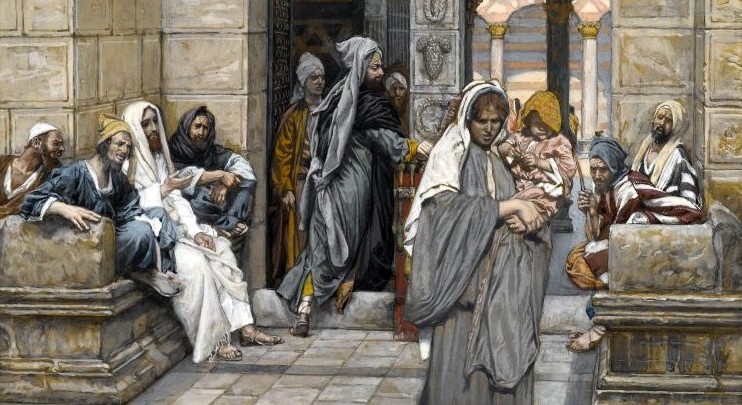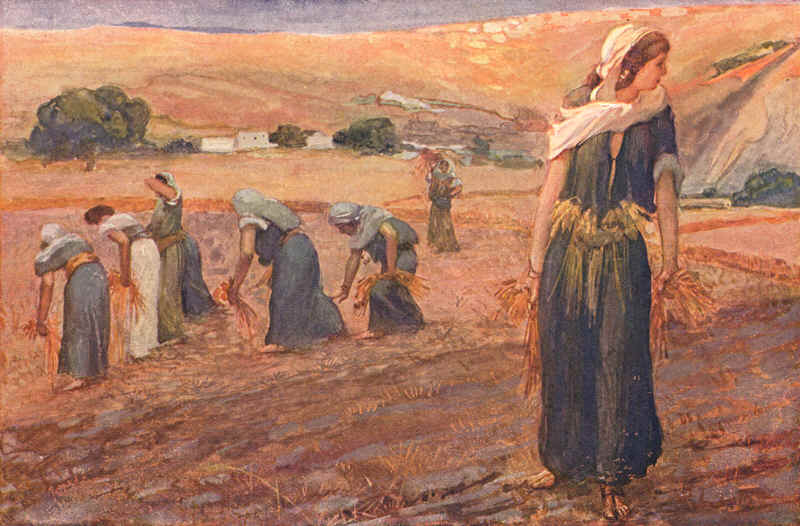
‘The Widow’s Mite’ by James Tissot, ca. 1886, The Brooklyn Museum

By the Rev. Christine Maddux, Deacon
Christ Anglican Church, Cashiers, NC
“What are you giving up for Lent?”
I have heard this question ever since I was a child. Back then, giving up candy (which we seldom had at home anyway) was much easier than giving up bickering with my siblings, with whom I lived in close quarters day and night.
Even people who do not observe Lent sometimes ask, “What are you giving up?”, because that particular practice seems to be the best-known aspect of Lent. And indeed, fasting from something enjoyable like candy (or something self-centered, like bickering) for 40 days is powerful, as we deny ourselves for the sake of drawing closer to God. But giving something up – fasting – is not the only way we do this during Lent.
Prayer, a powerful practice year-round, is traditionally intensified during Lent. It dovetails readily with fasting, as each occasion to rein in our personal desires prompts us to pray. As we pray for the strength to resist temptation and maintain our fast, we enter into Christ’s suffering in some small way, which strengthens our spiritual backbone.
But there is another Lenten practice which receives less attention: alms-giving.
Giving to the poor has been inherent in Christianity from the very outset, rooted in its Jewish heritage. Jesus, a faithful Jew, just assumed that his followers would give alms, telling them, “when (not if) you give to the needy, sound no trumpet before you, as the hypocrites do… But when you give to the needy, do not let your left hand know what your right hand is doing, so that your giving may be in secret. And your Father who sees in secret will reward you” (Matthew 6:2-4, emphasis added).
Therefore, alms-giving was integral to the early Church. The Christians in Antioch gave generously to their brothers and sisters in Christ who were soon to suffer from the famine prophesied for Judea (Acts 11:27-30). The Church was also instructed to care for widows who had no family to support them (1 Timothy 5:16). As a deacon, I am reminded that distributing food to the needy widows was the initial impetus in establishing diaconal ministry (Acts 6:1-6). Perhaps that is why God brought the sometimes-neglected practice of alms-giving to my attention with rather convicting insistence this Lent.
But no one ever asks, “Whom are you giving to for Lent?”
Is that because we want to be secretive, to honor Jesus’ admonition to not let our right hand know what our left hand is doing regarding alms-giving?
Or, might it be that we are not truly focused on giving to the poor, especially as we lick our own financial wounds of late? Perhaps we need to reflect anew on alms-giving, and how it aligns with God’s heart.

‘Gleaners, as in Deuteronomy’ by James Tissot
God’s concern for the poor is clearly revealed in almost every book of the Bible. Early on, He instructed his people through the Mosaic law to leave the crops on the edges of the fields and the gleanings for the poor, and likewise the fallen grapes in the vineyards (Leviticus 19:9-10). And by Jesus’ own testimony, we can see that God is pleased when we give sacrificially, instead of just giving spare change (Mark 12:41-44).
This understanding is echoed in Paul’s remarks about the churches in Macedonia, whose “abundance of joy and their extreme poverty have overflowed in a wealth of generosity on their part. For they gave according to their means, as I can testify, and beyond their means, of their own accord, begging us earnestly for the favor of taking part in the relief of the saints” (2 Corinthians 8:2-4). Paul saw their joyful generosity as an act of grace and proof of their genuine love for God and others, and calls us to emulate them in both attitude and action (v. 5-7).
And this becomes easy when we ponder “the grace of our Lord Jesus Christ, that though he was rich, yet for your sake he became poor, so that you by his poverty might become rich” (2 Corinthians 8:9). This thought alone should move us to eager generosity, knowing that whenever we give “to one of the least of these,” we give to Him (Matthew 25:40).
When we see needy people through the loving eyes of Jesus, we will no longer view sacrificial alms-giving as a spiritual discipline or moral duty. We will see it as the joyful privilege of giving freely to Jesus, by sharing his grace, love, and provision with others in just a fraction of the way He has showered it upon us.
Read more from Deacon Christine Maddux in her Deacon’s Column for Christ Anglican Church, Cashiers, NC.
